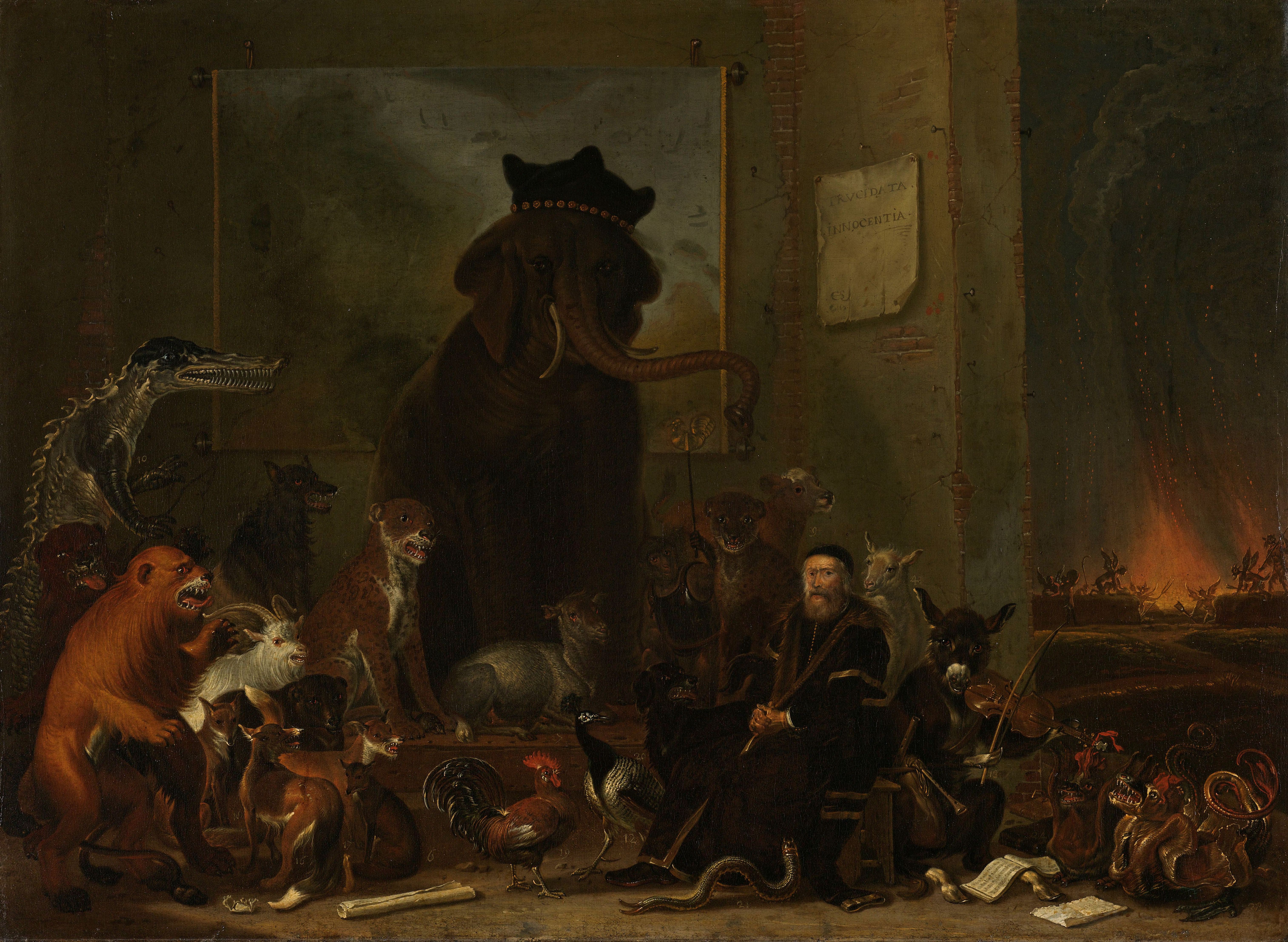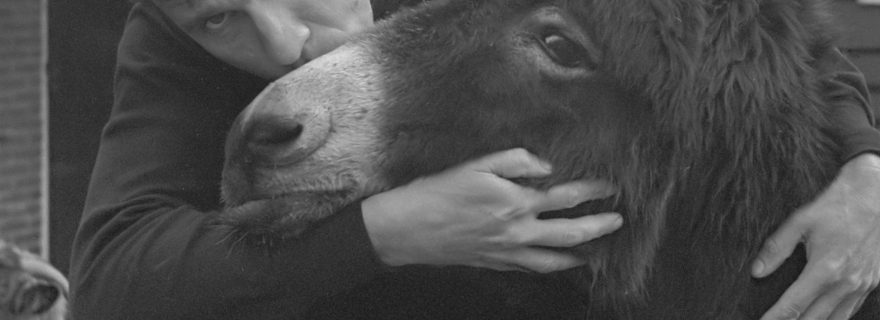Donkeys, Vondel and Reve
What do donkeys, Joost van den Vondel and Gerard van het Reve have in common? A lot it seems! In this blog, Tim Vergeer discusses why Vondel was a Reve avant la lettre, or better yet, why Reve was a second Vondel.
Many Dutchmen and -women know the ‘Grote Drie’, the three greatest authors of the twentieth century: Willem Frederik Hermans, Harry Mulisch, and Gerard Reve. The last man in this hostile triumvirate of writers was a man of spectacle, a man of jest and a man who wanted to shock. Gerard Reve was not afraid to insult everyone whom he disliked. One of his famous and most favourite remarks about Mulisch was for example: ‘Mullis is vullis. Nee Reve, dat is pas leven!’ (‘Mulisch is garbage. No Reve, that is a way of living!’).
Making Love to Donkey-God
Apart from that, Reve often showed himself to be a supporter of the Apartheid in South-Africa, which deserved him a place on the black list of the anti-Apartheid lobby. Reve provoked everything and everyone. He converted to Catholicism, he came out as homosexual on television, and in Nader tot U, he had described the narrator’s love-making to God, a visitor to his house incarnated in a one-year-old mouse-grey donkey. In the book, Reve writes:
En God Zelf zou bij mij langs komen in de gedaante van een éénjarige,
muisgrijze Ezel en voor de deur staan en aanbellen en zeggen: ‘Gerard,
dat boek van je – weet je dat Ik bij sommige stukken gehuild heb?’
‘Mijn Heer en mijn God! Geloofd weze Uw Naam tot in alle Eeuwigheid!
Ik houd zo verschrikkelijk veel van U,’ zou ik proberen te zeggen, maar
halverwege zou ik al in janken uitbarsten, en Hem beginnen te kussen
en naar binnen trekken, en na een geweldige klauterpartij om de trap
naar het slaapkamertje op te komen, zou ik Hem drie keer achter elkaar
langdurig in Zijn Geheime Opening bezitten...
(Van het Reve, Nader tot U, 112-113)
Blasphemy and bestiality, or so did the public prosecutor say in the legal proceedings that followed these statements. In appeal, he won the so-called ‘Ezelsproces’ of 1966-1968. He did not have the intention of blasphemy, but truly loved God. Why should his understanding of God be any less important than those of Christians or Jews?
_(Nationaal_Archief).jpg)
G.K. van het Reve met Ezel 1969 (foto: Joost Evers; bron: nationaalarchief.nl)
Vondel’s Prosecution
Some 340 years earlier, in 1625, Joost van den Vondel was prosecuted as well for his political play Palamedes. In the allegorical play, he had condemned Prince Maurice of Orange’s hubris and hunger for power. Vondel had taken a risk by publishing under his own name shortly after the death of the Prince. And the authorities in The Hague quickly accepted a resolution asking for prosecution of the author. The dead penalty was a realistic punishment for political sedition.
Thus, Vondel went into hiding at his sister’s house. She was not amused and said that he should seize writing. It only brought him and her family grave danger. According to Vondel’s first biographer, Geeraardt Brandt, Vondel replied: ‘I will tell the people the truth even more sternly’, and he wrote several more hekeldichten (satirical poems), which genre Vondel had mastered like none other. Eventually, Vondel was not delivered up to The Hague, but judged in Amsterdam. In his defence Vondel’s lawyers would have likely said the following:
[…] that one should regard the tragedy as a Greek history [and] that the
contents should be understood not according to whatever one or another
squeezes from the text and extracts with pincers, but according to the
explanation of the author, because all authors are explainers of their
own work.
(trans. of Brandt, Het leven van Joost van den Vondel, 17)
.jpg)
Frontispiece from Vondel's Palamedes 1625
Eventually, Vondel was only fined for three hundred guilders, an amount which by researchers has been converted to 3150 euros. Relatively speaking, it was a light punishment.
Like Reve, Vondel was a writer who told the unvarnished truth. He did so in Palamedes, but also in the many hekeldichten he wrote. One of the most famous is ‘Het Stockske van Joan van Oldenbarnevelt, Vader des Vaderlants’ lauding the Grand Pensionary (kind of prime minister) and condemning Prince Maurice again. However, as promised, I will now turn to another example, one which is illustrative of the donkeys in Vondel’s oeuvre.

Cornelis Saftleven, Satire op de berechting van Johan van Oldenbarnevelt, 1663, olieverf op doek. Rijksmuseum Amsterdam
Aesop’s Donkeys
Like Reve, Vondel had a thing for donkeys, although he would never dare claim to have had sex with any donkey, godly or otherwise. Like Reve, Vondel also (re)converted to Catholicism, and like Reve, Vondel often attacked public figures such as Maurice of Orange, other authors, and his fellow colleagues among whom Samuel Coster.
In two poems (or songs) called ‘Esopus-ezels op ’t tonneel’ and ‘Esopus-ezels op de stoel’, Vondel compares Coster and his fellow Academicians to Aesop’s donkeys. Aesop was a Greek writer of fables and in one fable he writes about a miller, his son, and a donkey, where eventually the miller will bear the donkey on his back; a hilarious sight to be sure as it is a world upside down. Coster and his Academicians are like such donkeys, according to Vondel at least:
I.
Esopus-Ezels op ’t Tonneel,
Esopus-Ezels op’t Tonneel,
Die speulen nu soo grof, dat veel,
Die gecken, die gecken,
Wel wenschen, voor een soet ghestreel,
De huyd vol blauwe plecken.
II .
Acadeemisten, vuyl ghespuys,
Acadeemisten, etc.
Kond ghy u Tong niet houden thuys,
Segh gecken, segh gecken?
Of wilt ghy u God’loose Cluys,
Door ’t sma’en, elck een ontdecken.
VI.
Soo speult nae Kosters Iphigeen,
Soo speult nae, etc.
Polixina, en niet te vre’en,
Als gecken, als gecken:
Van Vondels Palameed’, speult he’en,
Schoon ’t Land tot schand doet strecken.
(Vondel, De werken 1626-1636, 350-351)
In VI., Vondel is obviously not amused that his Palamedes cannot be performed, while Coster’s Iphigeneia and Polyxena can. Like Palamedes, Coster’s plays were also political. Vondel is not happy that he was fined for writing his allegorical play, whereas Coster was not.
You can thus see that both Reve and Vondel have a lot in common. They were both dissenters, politically prosecuted, they converted to Catholicism, and not in the least, they had a thing for donkeys. Their turbulent lives were as such always food for attention; a good reason to compare the two authors.
The way that Vondel and Reve kick up against the establishment by breaking conventions and even the law, is illustrative of the way that Dutch literature generally has worked and still works. Dutch authors take risks by almost bluntly telling the truth, but they do so with a great sense of humour. Vondel and Reve have both used the image of the donkey to accomplish that goal as I have tried to argue in this blog post.
Further Reading
Calis, Piet, Vondel. Het verhaal van zijn leven (Amsterdam: J.M. Meulenhoff 2008).
Maas, Nop, Gerard Reve. Kroniek van een schuldig leven. 1 De vroege jaren (1923-1962) (Amsterdam: Van Oorschot 2009).
Maas, Nop, Gerard Reve. Kroniek van een schuldig leven. 2 De ‘rampjaren’ (1962-1975) (Amsterdam: Van Oorschot 2010).
Maas, Nop, Gerard Reve. Kroniek van een schuldig leven. 3 De late jaren (1975-2006) (Amsterdam: Van Oorschot 2010).
Reve, Gerard, Nader tot U (Amsterdam: Van Oorschot 1966).
VPRO-NTR, Andere Tijden. Het raadsel van Reve. 16 december 2003. https://anderetijden.nl/aflevering/484/Het-raadsel-van-Reve.
Vondel, Joost van den, De werken van J. van den Vondel, edited by Jacob van Lennep. 16 dln. (Leiden: A.W. Slijthoff 1888).



0 Comments